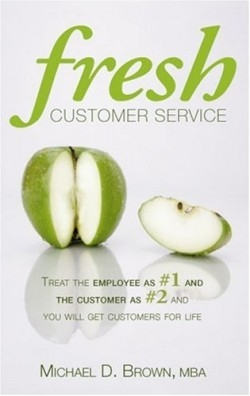Fresh Customer Service
Treat the Employee as #1 and the Customer as #2 and You Will Get Customers for Life
The customer is number one is the mantra of good business, so why do so many feel like number two, or three? Author Michael Brown, drawing on his background as both a front-of-the-store employee as well as an MBA-trained and Fortune 100 consultant, says that the reason so many companies struggle with keeping the customer satisfied is that they’re misplacing their efforts. By focusing on the needs of the customer, they are disempowering the employee, which can easily become a be a recipe for disaster.
For example, example, Brown documents an experience at a regional coffee bar. Although the line of customers snaked out the door and onto the sidewalk, one of the employees took time out to clean the front glass and dust the display shelves. When questioned, the well-meaning employee explained that company policy required them to clean every hour, regardless of how many customers were waiting for service.
Instead of specifying an arbitrary clean-every-hour task, asserts Brown, this company would have been far better served to empower the frontline employees. “The young worker’s priorities were convoluted,” he writes. “She did not feel empowered to hold off on the cleaning, even though it was rush hour, nor did she understand the consequences her decision to clean rather than to serve had on the overall customer experience. Customer service became the casualty of a clean shelf.” Using Smart Tasking, said company would have set priorities for each employee task, and fully explained the reasoning behind each. Employees must understand, Brown insists, how each task relates to the company’s overall goal—hopefully, to provide “world-class customer service.” Brown makes a compelling case for both customers and service employees everywhere: happy employees provide better service, and better service equals happy customers.
Disclosure: This article is not an endorsement, but a review. The publisher of this book provided free copies of the book to have their book reviewed by a professional reviewer. No fee was paid by the publisher for this review. Foreword Reviews only recommends books that we love. Foreword Magazine, Inc. is disclosing this in accordance with the Federal Trade Commission’s 16 CFR, Part 255.

